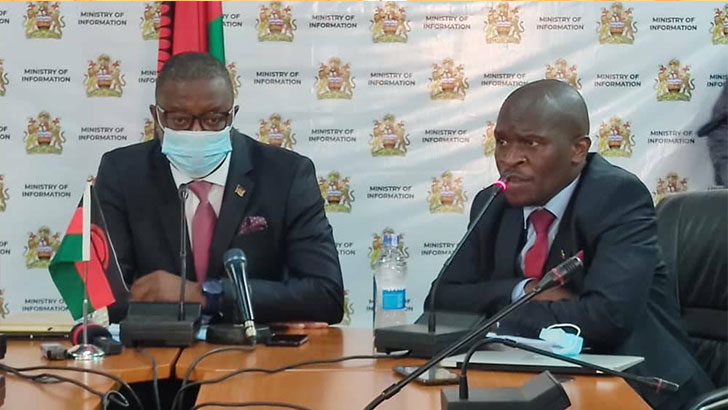Amnesty furore
The Attorney General (AG) has clarified that suspected key players in corruption allegations will not benefit from the 60-day amnesty he announced for individuals and institutions that may have aided suspected abuse of public resources through troubling contracts.
Speaking during a press briefing alongside Minister of Information Gospel Kazako and Director of Public Prosecutions (DPP) Steve Kayuni in Lilongwe yesterday, AG Thabo Chakaka Nyirenda specifically said individuals suspected of massive corruption such as businesspersons Zuneth Sattar, a subject of corruption investigations by the United Kingdom’s National Crimes Agency (NCA); Karim Batatawala recently arrested on fraud related charges and Zameer Karim, on trial for accusations that he defrauded the State, will not be beneficiaries of the amnesty.
But Malawi Law Society (MLS) has said the AG’s amnesty position has no legal basis.

During the press briefing, Chakaka Nyirenda moved to ease fears that the amnesty would be used to shield top government officials and shut down investigations into suspected corruption.
The AG, who critics accuse of usurping powers of the Anti-Corruption Bureau (ACB) in declaring the amnesty, further defended the legal basis of his decision.
He said the aim of the amnesty was to save public funds that are wasted due to prolonged court hearings. He, however, said that does not mean individuals who are implicated by overwhelming evidence will be let off the hook.
“Our focus is to recover money. We want to recover the K50 billion. We are not talking about where we have overwhelming evidence against the person. We are not talking about Sattar, Batawalala, Karim, Mapeto etc. If there are ministers who appear on the list, they will not be beneficiaries of the amnesty,” he said.
Nyirenda said his office will consult and ensure the amnesty process is transparent and accountable.
Asked where he drew the powers to declare the amnesty, the AG, without citing any specific legal provision, said the law establishing his office and also the Civil Procedures and Evidence instruments give him powers on the matter.
Said the AG: “I have powers under different laws under Financial Crimes Act. I supervise the DPP. [The] DPP has powers over supervision over the ACB. I have powers to initiate civil forfeiture assets. There is nothing in my statement that I say we are going to stop the ACB from investigating. We are trying to avoid needless acquittals.”
However, the AG said the main point of his message was that the Sattar investigation will not be shut down and that the government will continue cooperating with UK authorities.
MLS president Patrick Mpaka, however, said the AG has taken a risky path in opting for the amnesty.
“It is fair to say that so far, the Honourable AG has not been able to identify any legal basis both in the statement and at the conference for the amnesty decision.
“In line with clause 6(a) and (b) of the MLS public statement of 2nd December 2021 on the Sattar issue, we would urge these and any senior government officials to consistently rely on the law as a basis for any official decision. The law is their best backing,” he said.
Also reacting to the AG’s stance, Cape Town University-based law professor Danwood Chirwa dismissed Chakaka Nyirenda’s take on declaring the amnesty without involving the ACB.
Said Chirwa: “He does not have any supervisory power over the ACB. He may issue general or specific directions, but these may not relate to specific cases and must not be unconstitutional or unlawful. There’s a whole statute dedicated to the ACB. The AG’s so-called supervisory powers are not included in them. He is certainly the first to think he has such powers.”
Earlier, Kazako said government had called the briefing due to the huge public interest around the amnesty issue, saying various people have been curious to find out the mechanism for the amnesty.
President Chakwera, while campaigning for office in July 2018, vowed that once in office, his administration will provide no amnesty to anyone accused of stealing public funds.
“I will give no amnesty to thieves, they have been giving to each other amnesty for 25 years and enough is enough,” the president had said.
Later on Sunday, the ACB, which is mandated to independently investigate and prosecute all corruption-related matters, released a statement, saying it had only heard about the controversial AG decisions through social media.
“On Sunday, 9th January 2021, through social media, the bureau came to know about the above-mentioned press release regarding Zuneth Sattar. The last paragraph of the press release seems to suggest that the Attorney General is granting 60-day amnesty to all those who might have corruptly accumulated wealth through dealings with amongst others Zuneth Sattar,” reads part of the statement.
The bureau said it would review the AG’s statement and announce its position on the matter, insisting that it will continue with investigations.
Last month, the MLS warned that any “direct or indirect interference or any form of direction to the Anti-Corruption Bureau by any person or officeholder present or past in regard to the conduct of functions of the bureau is an illegality and does not promote the rule of law”.






One Comment